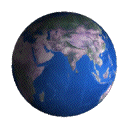Who are the net Muslims?
Muslims on the Internet: the Good, the Bad...the Ugly
by Huma Ahmad
The era of the technological age is upon us. We communicate in seconds with e-mails and fax's. Information of every type is accessible to anyone with a modem from what was originally intended to be a government network for research projects, now called the Internet. The average person is able to create, advertise and publish easily for an audience of millions on the World Wide Web. Thoughts and ideas are exchanged, discussed and argued across thousands of chat channels, muds and newsgroups for every possible topic ever imagined. Businesses, educators and fortune hunters all stumble over each other to see who can best exploit the new opportunities. The global electronic village is open for business and the garish neon 24 hour sign seems to keep blinking an urgent message: "New Frontier: Danger Ahead."
The philosophy of the Internet comes from its originators; laid back computer programmers, information and technology addicts. They wanted to create something special. Something no one business, government or group could control. A true democracy circumventing normal channels and reaching to the deepest grass roots. A frontier where anyone could go out and make it, where those with common interests could connect with each other and ignore the normal barriers of race, nationality, and tradition. An ideology of community, working together exchanging ideas, and making the world a better place was their vision.
Noble beginnings, and this too was in the minds of the Muslims when we first joined the rush. Many were even part of the original builders, software engineers, and programmers, due to many Muslims themselves being in the Computer Science Information fields. We began mailing lists, newsgroups, chat lines, and web pages about Islam. Here was one place where we could actually get the true message of Islam to the outside world. Through the net, we could influence those who never would have encountered Islam or only received their information from the media, orientalists or anti-Islam propagandists. We could reach others and share and discuss ideas to help bring the Ummah closer. Muslims separated and spread out all over could feel the intimacy of being an e-mail or modem's dial away from each other. It would open new heights in our ability to organize and plan events, to share knowledge, articles, experiences.
What we forgot though, was to read the sign.
click here to read the complete article
by Huma Ahmad
The era of the technological age is upon us. We communicate in seconds with e-mails and fax's. Information of every type is accessible to anyone with a modem from what was originally intended to be a government network for research projects, now called the Internet. The average person is able to create, advertise and publish easily for an audience of millions on the World Wide Web. Thoughts and ideas are exchanged, discussed and argued across thousands of chat channels, muds and newsgroups for every possible topic ever imagined. Businesses, educators and fortune hunters all stumble over each other to see who can best exploit the new opportunities. The global electronic village is open for business and the garish neon 24 hour sign seems to keep blinking an urgent message: "New Frontier: Danger Ahead."
The philosophy of the Internet comes from its originators; laid back computer programmers, information and technology addicts. They wanted to create something special. Something no one business, government or group could control. A true democracy circumventing normal channels and reaching to the deepest grass roots. A frontier where anyone could go out and make it, where those with common interests could connect with each other and ignore the normal barriers of race, nationality, and tradition. An ideology of community, working together exchanging ideas, and making the world a better place was their vision.
Noble beginnings, and this too was in the minds of the Muslims when we first joined the rush. Many were even part of the original builders, software engineers, and programmers, due to many Muslims themselves being in the Computer Science Information fields. We began mailing lists, newsgroups, chat lines, and web pages about Islam. Here was one place where we could actually get the true message of Islam to the outside world. Through the net, we could influence those who never would have encountered Islam or only received their information from the media, orientalists or anti-Islam propagandists. We could reach others and share and discuss ideas to help bring the Ummah closer. Muslims separated and spread out all over could feel the intimacy of being an e-mail or modem's dial away from each other. It would open new heights in our ability to organize and plan events, to share knowledge, articles, experiences.
What we forgot though, was to read the sign.
click here to read the complete article









<< Home